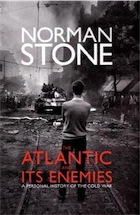
In a quirky recounting of the main events of the Cold War, Stone gets the good and bad guys right for the most part, but his work may be charitably described as thematically lopsided. Stone has the irritating habit of making every key point that he wants to make at least twice, and he spends too much time discussing the internal politics of Chile and Turkey, both of which underwent seminal "anti-Leftist" revolutions during the late 1970s, at a time when the West appeared to be in steep decline. There's also a lengthy "Note" in which Stone describes his three-months' imprisonment in Czechoslovakia for attempting to smuggle someone over the border to Austria. The prison adventure and the heavy focus on Turkey -- one of Stone's homes -- add the promised "personal" touch to the narrative, but they also prevent the book from being a "complete" history of the era. Stone is very good on the Communist takeovers in Eastern Europe and the good and bad points of the economic boom of the 1980s. Be aware, however, that you'll need to do some supplementary reading to get a full picture of what happened between 1945 and 1991.
No comments:
Post a Comment